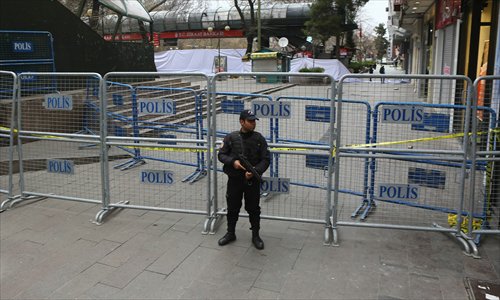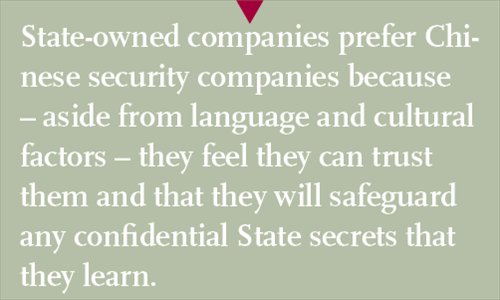Chinese security companies in great demand as overseas investment surges
As the government encourages State-owned companies to go abroad under the "One Belt and One Road" initiative, keeping Chinese workers safe abroad is becoming more important than ever.

A police officer stands guard at the security perimeter around the scene of an explosion on March 14, 2016, after a car bomb went off in central Ankara, Turkey. Photo: CFP
The regular bursts of gunfire on the mountains rang in the workers' ears. Two kilometers away from the shooting, about 600 Chinese citizens continued their construction work.
Some of them were so afraid that they wanted to talk about it with Li Xin, the project's security consultant.
"Don't worry. It's just a military drill, not a real battle. You will be safe," Li told the workers.
But the 37-year-old knew exactly what was going on. The Turkish army was skirmishing with the PKK, a militant left-wing Kurdish political party that has been fighting the Turkish government since the late 1970s. But he didn't want to scare the workers.
"I felt a bit worried, but I didn't feel afraid. I've got a backup plan for the worst-case scenario, if the PKK breach the army's defenses," Li told the Global Times. If that happened, workers will take shelter in a bullet-proof structure built for this purpose.
Li was entrusted with this security mission right after three of the project's workers were kidnapped by the PKK in 2014. The Chinese State-owned enterprise responsible for the project hired one of China's leading private security companies (PSCs) VSS Security Group - of which Li is an employee.
The company - which Li declined to name - stopped work for about four months after the kidnapping. During that time, Li went to the construction site in Turkey to help them upgrade their security.
As Chinese companies increasingly go abroad, especially given the government's current enthusiasm for infrastructure projects across Eurasia, Li is just one of many thousands of security workers that have been paid to protect workers in dangerous environments.
Liu Xinping, deputy director of the China Overseas Security and Defense Research Center, estimated that the China National Petroleum Corporation, the Sinopec Group and the China National Offshore Oil Corporation, together spend about $2 billion a year in overseas security.
"Many Chinese companies want to use Chinese PSCs. But the problem is that there is a lack of qualified PSCs that can provide complete security services," Liu told the Global Times.

On duty
Before Li went to the site, the place was guarded by Turkish security staff.
"There were many loopholes," he recalled. After his arrival, CCTV cameras were installed; the barbed wire surrounding the campsite was replaced by a reinforced concrete wall; and electronic alarms were set up.
Later the three hostages were released due to the efforts of the Chinese and Turkish governments.
Li served in the People's Liberation Army special forces for five years before joining VSS. He used to give lectures to workers on what they can do to stay safe if they face a terrorist attack. In 2009, the company began to send its staff overseas with Chinese companies.
His first mission was to Sudan. One night, a worker was kidnapped by armed locals. They said they would release the Chinese national only if the Sudanese government released their leader's brother, who had been imprisoned for smuggling ammunition.
"This got the attention of the then Sudanese president. On the day of the negotiations, the tribe was surrounded by Sudan's army. Eventually, they released our hostage," Li said.
According to him, Chinese private security workers are forbidden from carrying guns under national law, even when overseas. So when there are terrorist attacks and people are kidnapped, they would immediately contact their local embassy to help deal with those issues.
"This [being unable to carry a gun] poses a hurdle for us," said he. "But I can use what I learned in the army to give security suggestions and make advanced plans, and I also supervise foreign security staff."
Rising market
Zhai Leiming, deputy director-general of the Department of Consular Affairs of the Ministry of Foreign Affairs, said in April 2015 that Chinese consulates are chronically short of staff. "Each employee has to protect 200,000 citizens. No nation in the world has ever dealt with such a huge task," Zhai said, referring to the disparity between the total number of Chinese consulate staff and the total number of Chinese going abroad every year.
On the other hand, there is no shortage of Chinese investment abroad. In 2015, it reached about 735.1 billion yuan ($111 billion). And Chinese investors are often seen in countries which are less popular with Western investors, due to their political instability or controversial governments, reported news portal NetEase.
So private PSCs are filling the gap. Zhe Meijie, founder of the VSS Security Group, told the Global Times that the "One Belt and One Road" initiative has been a boon to his business.
"Under the initiative, how to protect Chinese people and companies' interests overseas has become a national focus. Also, as more and more Chinese companies and citizens go abroad, many have encountered terrorist attacks and need protection," he said.
Last year, three Chinese executives from a State-owned railway company were killed in a hotel attack in the West African nation of Mali.
Most of Zhe's clients are State-owned companies. "There are also some big private enterprises and few international organizations," he said.
Zhe noted that State-owned companies prefer Chinese PSCs because - aside from language and cultural factors - they feel they can trust them and that they will safeguard any confidential State secrets that they learn.
According to Zhe, in the past they mainly provided security services in Southeast Asia, Africa and Southern Africa. Now many PSC are focusing on countries along the "belt" part of the "One Belt and One Road" that stretches from China to Europe through Central Asia and the Middle East.
Weldon Security is another leading Chinese PSC which has provided overseas security services since 2015. It has a branch office in Qatar.
"Because of the increasing intensity of anti-terrorism efforts in the Gulf, the demand for Chinese PSCs in this area keeps increasing," said Fang Fulai, a manager at Weldon Security.
Fang's company also has plans to expand its business to other countries along the "One Belt."
Competing with Western counterparts
In April, the ifeng International think tank ranked Chinese PSCs and foreign PSCs operating in China, with the London-based PSCs G4S and Control Risks ranking first and second. The report pointed out there is a big gap between Chinese PSCs and foreign PSCs, according to the China Youth Daily.
The firms were ranked based on the services they offer, the number of companies they cater to, the number of branch offices they have set up overseas, their ability to deal with major incidents and the number of languages in which they can offer services.
"G4S has been in the security and protection field for 100 years and Control Risks started working overseas in 1975. While the mainstream Chinese PSCs only started their businesses after 1993," read the report.
Liu told the Global Times that the big foreign PSCs issue very detailed contracts that are usually dozens of pages long. By comparison, the contracts of many Chinese PSCs are only a few pages long.
Zhe admitted that there is a huge gap between foreign and Chinese PSCs as the latter lack experience and many Chinese companies still think overseas security is mostly about the number of boots you can put on the ground.
"They don't know that operating overseas is a complicated task. You need to have a full understanding of their cultures and political situation, in addition to introducing advanced security systems," he said, adding that if the most important thing is simply the number of people you can deploy then firms should just hire local PSCs that are even cheaper.
Also, as most Chinese soldiers have never been deployed abroad, they have little experience of dealing with other cultures, added Zhe.
In Li's mind, unlike their Western counterparts who speak fluent English, language is another barrier for Chinese PSC employees.
While there are many disadvantages, Zhe says he feels that his staff are especially hardworking.
They are willing to work past the specified end date of their contract, while many foreign security staff leave immediately on that date even if their replacement hasn't yet started, he said.
"Besides, we are cheaper than those Western PSCs. Generally, we are half their price," Zhe noted.
Fu's company has worked with foreign PSCs since 2011. Now they are working together with a Qatari PSC.
"The foreign workers we met aren't as disciplined as we are. They can't effectively solve the clients' problems," he said.
"We send Chinese staff to train those foreign security workers in Qatar. The people we train are more qualified than theirs," Fu said.
Seeking a way out
Zhe noted that one of the main obstacles for Chinese PSCs is a lack of trained people to choose from.
In many Western countries, it is not unusual for veterans and armed police officers to go into private security after they leave the army or police. While in China, they're more likely to get a stable job in the civil service, he said. "This needs to be addressed."
Currently, the company is trying to work with other relevant organizations to see whether a national security talent database can be built.
Liu said that so far about 20 Chinese PSCs have entered the overseas market, but they are already facing tough, and sometimes dishonest, competition.
"Some companies who are not qualified are calling themselves consulting companies to fight for the security projects overseas, by offering a cheaper price," he said.
Li said that he once met a Chinese security consultant overseas, who claimed to be a retired soldier. "It turned out that he faked his identity. I found out because he claimed that he worked in the force where I once served, but he did not know any of that force's leaders."
Liu suggested that an overseas security industry association should be set up and entry standards for companies established.
Newspaper headline: Watching out for workers